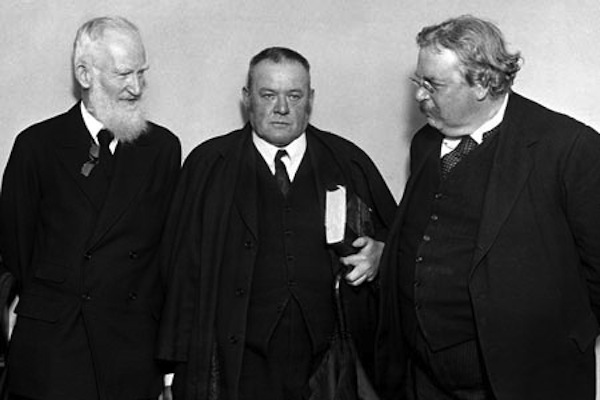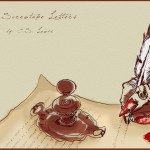I have now read about half of the total collection of stories featuring Father Brown, GK Chesterton’s erstwhile detective. Chesterton describes him “as commonplace a person as could be seen anywhere, with a round, brown-haired head and a round snub nose… clad in clerical black.” He is very short and is elsewhere described as “ugly.” Most people who don’t know him pay very little attention to Father Brown. He neither collects fingerprints nor tails suspects, and unlike Sherlock Holmes, he dons no costume but his robes as a Roman Catholic Priest.
Father Brown does very little conventional detective work in any case he takes on. Instead, he solves mysteries wherever he goes because he is wise, intuitive, and keenly observant. He sees beneath the surface of things, and his vast knowledge of human nature allows him to detect the smallest signs of distress and deceit. He watches, and listens, and more often than not, even the hardened criminal ultimately confesses his or her guilt to Father Brown.
In contrast, his constant companion, his “Watson” if you will, is Flambeau, a master-criminal-turned-private-detective. Flambeau is tall, French, and impulsive—he couldn’t be more different from the little English priest. Yet it is Flambeau who must always turn to Father Brown to explain what has occurred.
In his oft-quoted essay “The Ethics of Elfland,” Chesterton argued that fairy stories “say that apples were golden only to refresh the forgotten moment when we found that they were green. They make rivers run with wine only to make us remember, for one wild moment, that they run with water.” In other words, confronting the supernatural in fairy stories helps us to remember and cherish the sense of awe that we felt as children upon discovering the miraculous way things actually are.
Father Brown helps Chesterton to make a similar, yet opposite, point. As I have said, Father Brown’s sense of the way things really are is much more acute than most people’s. He overlooks little and sees more than his fair share of horrors throughout the course of his mystery-solving career. But at no point does he ever become jaded or accustomed to the ways that people err, wronging themselves, or others, or both.
Perhaps the best description of Father Brown’s philosophy is found in the story “The Purple Wig.” When asked to leave a stone unturned (or in this case, a wig un-removed), he refuses. “I know the Unknown God. I know his name; it is Satan. The true God was made flesh and dwelt among us. And I say to you, wherever you find men ruled merely by mystery, it is the mystery of iniquity. If the devil tells you something is too fearful to look at, look at it. If he says something is too terrible to hear, hear it. If you think some truth unbearable, bear it,” says Father Brown.
It’s not that he doesn’t know when to leave well enough alone. In “The Sign of the Broken Sword,” Brown reveals to Flambeau that a great English general, admired by all and honored by a good number of statues, was in fact a cad who was executed by his own men. “There is so much good and so much evil in breaking secrets,” says Brown. He allows the general to go on being honored—and inspiring many—saying only that he will speak out if keeping the secret will harm any of the innocent men who were involved in the incident. In this case, revealing the truth will do more harm than good.
This is not an easy decision for Father Brown, and he has obviously wrestled with the issue for a long time before he relates the story to his friend. And that is, I think, the most Chestertonian quality of the little priest. No matter how much depravity he observes, it is clearly never easy for him to bear it. His wisdom comes from experience, not from clever tricks. In “The Eye of Apollo,” after giving a murderer the chance to confess a crime, “Father Brown’s face seemed to express nothing but extreme distress; he looked at the ground with one wrinkle of pain across his forehead.” This expression of distress is common for Father Brown when confronted with evil.
Just as the golden apples in the fairy story remind us that green apples in the real world are amazing and beautiful, the somewhat fantastical murders in the Father Brown stories remind us that human beings are really capable of great evil. But as Father Brown says, “The foulest crime the fiends ever prompted feels lighter after confession.” He is anxious and distressed not only for the victims of crimes, but also for their perpetrators. He is wise in the ways of sin and deception, but he does not allow himself to become accustomed to them.
The elaborate crimes and trickery make Father Brown stories fun to read; his proper attitude toward people’s sin and confession make them a valuable reminder that both awe and horror in our world are real and ought to be felt.
[Image of GK Chesterton, GB Shaw, and Hilare Belloc from Wikipedia]

















